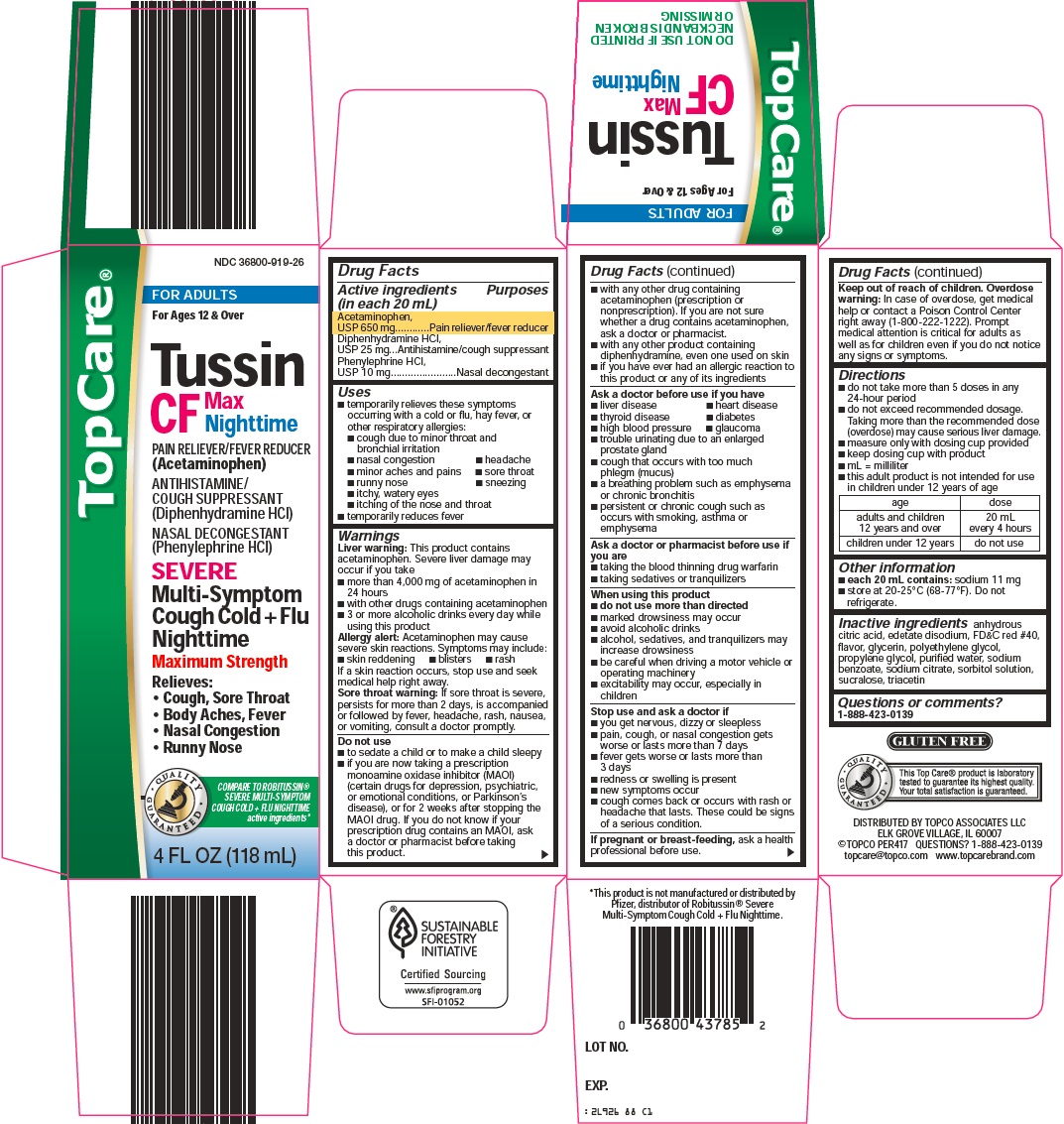Topcare Tussin Cf | Acetaminophen, Diphenhydramine Hcl, Phenylephrine Hcl Solution while Breastfeeding

What is Topcare Tussin Cf | Acetaminophen, Diphenhydramine Hcl, Phenylephrine Hcl Solution ?
Brief: Pain reliever/fever reducer Antihistamine/cough suppressant Nasal decongestant
Can I use Topcare Tussin Cf | Acetaminophen, Diphenhydramine Hcl, Phenylephrine Hcl Solution while breastfeeding?

Topcare Tussin Cf | Acetaminophen, Diphenhydramine Hcl, Phenylephrine Hcl Solution Breastfeeding Analsys
Acetaminophen while Breastfeeding
SafeCAS Number: 103-90-2
Excreted in very low amount into breast milk. Infant intake may be lower than 4% of usual pediatric dose. The American Academy of Pediatrics rates it as compatible with Breastfeeding.
Diphenhydramine hydrochloride while Breastfeeding
Low RiskCAS Number: 58-73-1
It is a first generation antihistamine drug (Ethanolamine) with a strong sedative effect. A high protein-binding capacity makes difficult an excretion into breast milk in significant amounts in accordance with old studies that had confirmed it. The absorption from ingested mother's milk to the infant's plasma is hampered by a low oral bioavailability. For both, the mother and the infant is safer the use of antihistamine medication with higher safety levels without sedative effect, especially when the child is a premature or younger than 1 month old. Neither a decrease of milk production nor alteration of Prolactin release have been shown with the use of this drug. When used while breastfeeding do it with the lower dose as possible and avoid a long-term use. Check up for feeding difficulty and somnolence in the infant. Bed-sharing with the infant is not recommended for parents who are on this medication.
Phenylephrine hydrochloride while Breastfeeding
Low RiskCAS Number: 59-42-7
Used on topical decongestant solutions for nose drops at low concentration. 10% midriatic eye drops are available. Because low concentration is used on nose and ophtalmic drops a significant excretion into breast milk is unlikely. Low oral biodisponibility minimizes any risk of harmful effect in the infant. Authorized for nasal or ophtalmic use on children aged younger than 1 year. Although on latest update relevant data on breastfeeding was not found it is considered to be safe when minimal dose is used. Avoid excessive or long term use. A related drug Pseudoephedrine can inhibit milk production. It would be advisable to press on the lachrimal sac to minimize absorption.
Topcare Tussin Cf | Acetaminophen, Diphenhydramine Hcl, Phenylephrine Hcl Solution Breastfeeding Analsys - 2
Acetaminophen while Breastfeeding
CAS Number: 103-90-2
Acetaminophen is a good choice for analgesia, and fever reduction in nursing mothers. Amounts in milk are much less than doses usually given to infants. Adverse effects in breastfed infants appear to be rare.
Diphenhydramine hydrochloride while Breastfeeding
CAS Number: 58-73-1
Small, occasional doses of diphenhydramine would not be expected to cause any adverse effects in breastfed infants. Larger doses or more prolonged use may cause effects in the infant or decrease the milk supply, particularly in combination with a sympathomimetic such as pseudoephedrine or before lactation is well established. Single bedtime doses after the last feeding of the day may be adequate for many women and will minimize any effects of the drug. The nonsedating antihistamines are preferred alternatives.
Phenylephrine hydrochloride while Breastfeeding
CAS Number: 59-42-7
The oral bioavailability of phenylephrine is only about 40%,[1] so the drug is unlikely to reach the infant in large amounts. However, intravenous or oral administration of phenylephrine might decrease milk production. Because no information is available on the use of oral phenylephrine during breastfeeding, an alternate drug may be preferred, especially while nursing a newborn or preterm infant.Phenylephrine nasal spray or ophthalmic drops are less likely to decrease lactation. To substantially diminish the effect of the drug after using eye drops, place pressure over the tear duct by the corner of the eye for 1 minute or more, then remove the excess solution with an absorbent tissue.
I already used Topcare Tussin Cf | Acetaminophen, Diphenhydramine Hcl, Phenylephrine Hcl Solution and meanwhile I breastfed my baby should I be concerned?
Topcare Tussin Cf | Acetaminophen, Diphenhydramine Hcl, Phenylephrine Hcl Solution is in the category of low risk, if you have already used it then its not a big deal if health and behavior of baby is good. However your health care provider shall be aware of the fact that you have used Topcare Tussin Cf | Acetaminophen, Diphenhydramine Hcl, Phenylephrine Hcl Solution so you should inform him based on your convenience.
My doctor has prescribed me Topcare Tussin Cf | Acetaminophen, Diphenhydramine Hcl, Phenylephrine Hcl Solution, what should I do?
Though Topcare Tussin Cf | Acetaminophen, Diphenhydramine Hcl, Phenylephrine Hcl Solution dose not comes in category of safe drugs rather it comes in category of low risk but if your doctor is aware that you are breastfeeding your baby and has still recommended it then its advantages must be outweighing the risks.
If I am using Topcare Tussin Cf | Acetaminophen, Diphenhydramine Hcl, Phenylephrine Hcl Solution, will my baby need extra monitoring?
Not much monitoring required while using Topcare Tussin Cf | Acetaminophen, Diphenhydramine Hcl, Phenylephrine Hcl Solution
Who can I talk to if I have questions about usage of Topcare Tussin Cf | Acetaminophen, Diphenhydramine Hcl, Phenylephrine Hcl Solution in breastfeeding?
US
National Womens Health and Breastfeeding Helpline: 800-994-9662 (TDD 888-220-5446) 9 a.m. and 6 p.m. ET, Monday through Friday
UK
National Breastfeeding Helpline: 0300-100-0212 9.30am to 9.30pm, daily
Association of Breastfeeding Mothers: 0300-330-5453
La Leche League: 0345-120-2918
The Breastfeeding Network supporter line in Bengali and Sylheti: 0300-456-2421
National Childbirth Trust (NCT): 0300-330-0700
Australia
National Breastfeeding Helpline: 1800-686-268 24 hours a day, 7 days a week
Canada
Telehealth Ontario for breastfeeding: 1-866-797-0000 24 hours a day, 7 days a week
